Key takeaways:
- Understanding ticket types and refund policies is essential to avoid financial loss.
- Be cautious of “too good to be true” deals and always verify sellers to avoid scams.
- Use official websites and trusted platforms for purchasing tickets to ensure authenticity.
- Trust your instincts when something feels off, and stay informed about ticketing options.
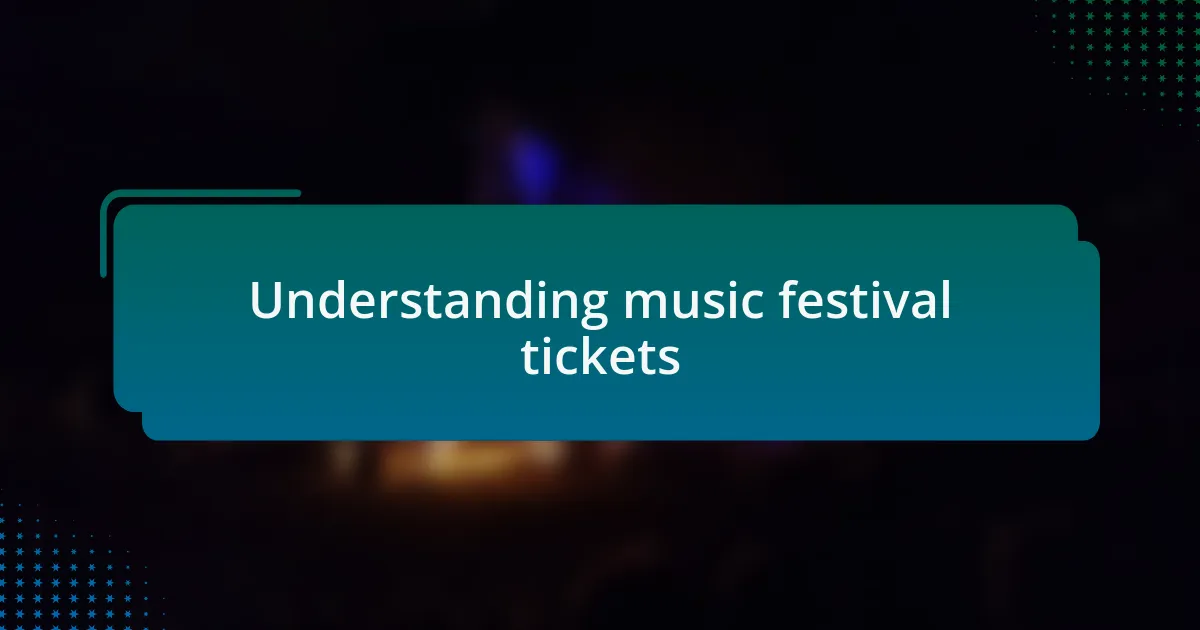
Understanding music festival tickets
When it comes to music festival tickets, understanding their types is crucial. There are general admission tickets, VIP passes, and sometimes even early bird discounts. I’ve often found myself wondering which one truly offers the best experience. Do I splurge for VIP to skip the lines and get closer to the stage?
Then there’s the process of purchasing these tickets. I still remember the excitement—and anxiety—of buying my first festival ticket online. It’s a rush to secure your spot, but it can also be overwhelming. Have you ever clicked “purchase” only to realize you weren’t entirely sure about the authenticity of the seller?
Moreover, it’s vital to pay attention to refund policies and resale options. I recall a time when my plans changed unexpectedly, and I was left scrambling to figure out how to get my money back. Why are these details so often overlooked? Understanding the fine print can save you from potential heartache down the line.
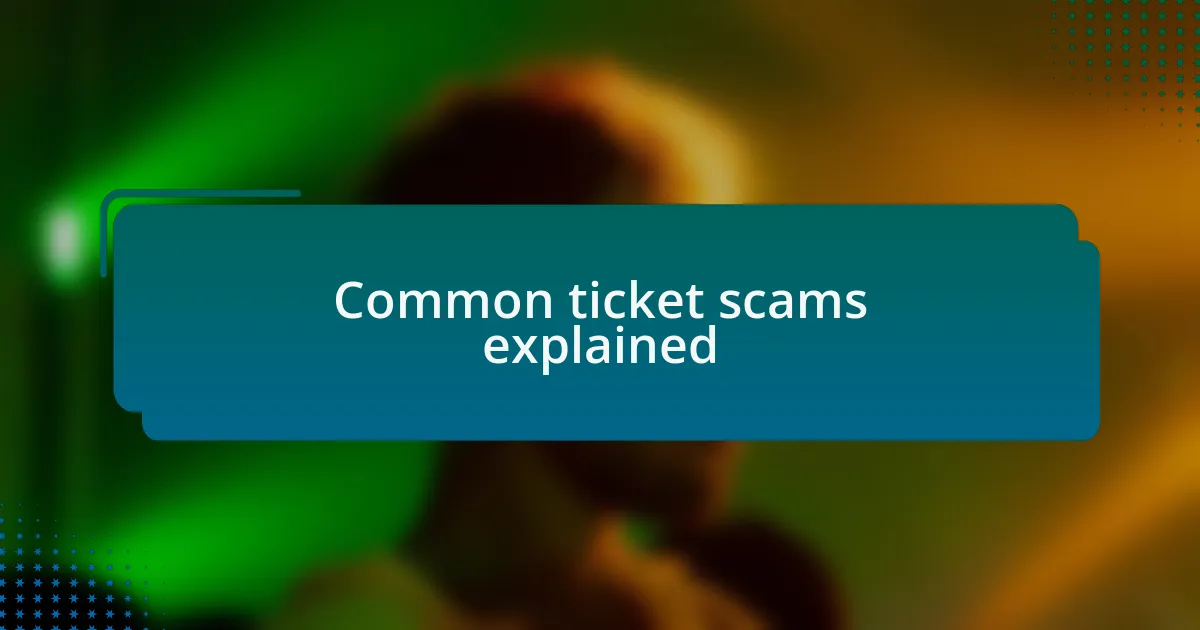
Common ticket scams explained
When it comes to ticket scams, one of the most common pitfalls is the “too good to be true” deal. I remember seeing festival tickets listed on social media for half the price, and I nearly jumped at the chance. But thankfully, I paused to do some research. Often, these posts are from scammers who create fake profiles to trick unsuspecting fans into paying for nonexistent tickets.
Another prevalent scam involves the resale of counterfeit tickets, often sold through unofficial channels. I once encountered a situation where a friend bought what seemed like a legitimate ticket from a third-party website. The day of the festival came, and he was sorely disappointed when he discovered that his ticket was a total fake. It was a harsh lesson in the importance of buying from trusted sources.
Lastly, phishing scams are more common than we might think. Just the other day, I received an email that looked like it was selling tickets for a major festival, complete with logos and catchy slogans. Upon closer inspection, the links led to a sketchy website. It made me realize that vigilance is key; if something doesn’t feel right, it’s worth digging deeper before jumping in.
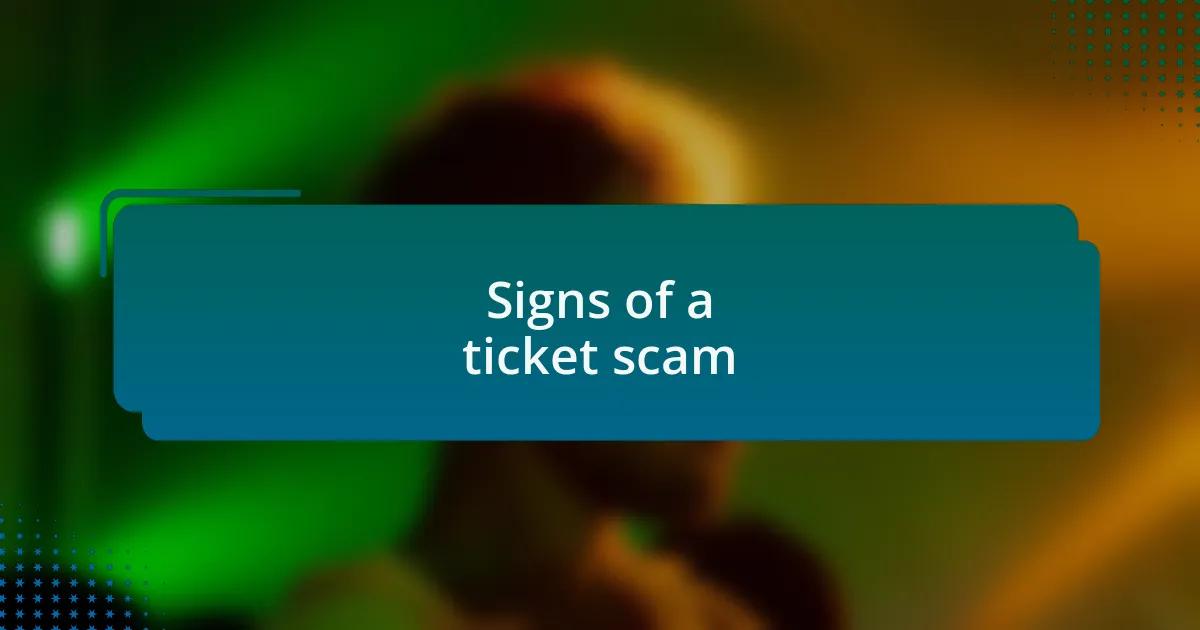
Signs of a ticket scam
When it comes to spotting ticket scams, the urgency created by sellers can be a major red flag. I recall feeling the pressure when I stumbled upon an ad that said tickets were “going fast!” Did they really expect me to rush into a purchase without doing some homework? It turned out that was just a tactic to spur impulsiveness, a classic sign that the deal might be too risky.
Another telltale sign is the payment method that the seller insists on using. For instance, I once encountered a tempting offer where the seller only accepted wire transfers. That was a huge warning sign for me; legitimate vendors offer secure payment options like credit cards or established payment platforms. It made me wonder—why wouldn’t they want to provide a safer transaction method if they were operating above board?
Moreover, unprofessional communication can reveal a scammer’s intent. I’ve received messages that were riddled with spelling mistakes and awkward phrasing when inquiring about tickets. If a seller can’t take the time to present themselves professionally, how trustworthy are they really? This experience reminded me that clear and polite communication from a seller is something I always look for now; it just feels safer and much more reassuring.
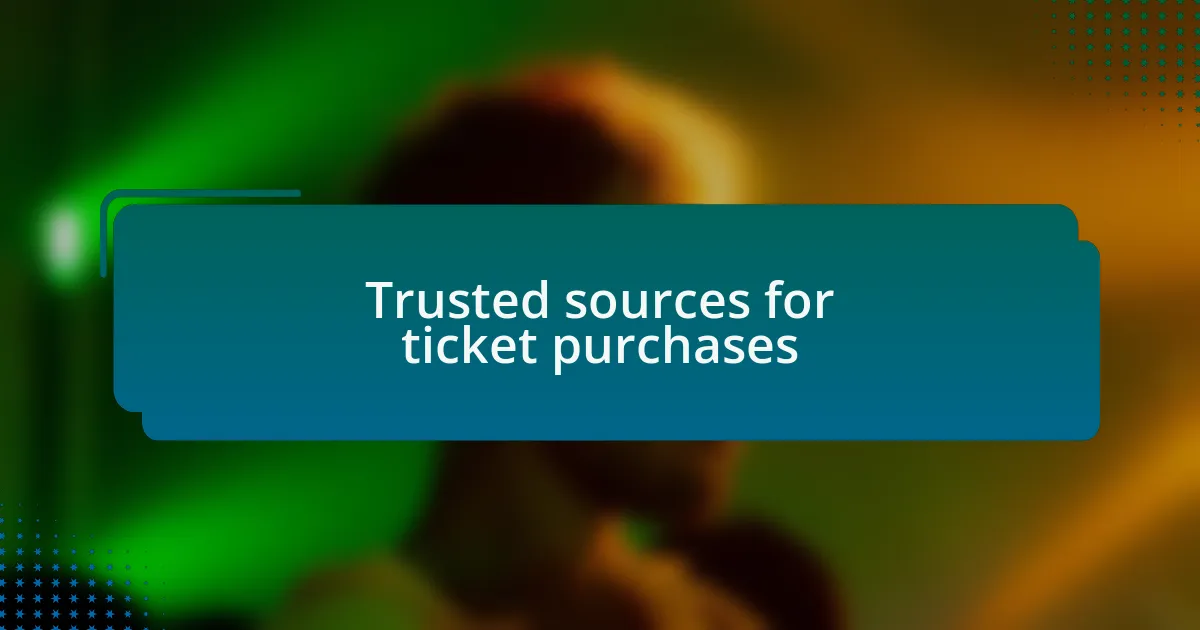
Trusted sources for ticket purchases
When buying tickets, I always prioritize purchasing from official websites or trusted marketplaces. I remember last summer when I meticulously scoured the festival’s official site for ticket links, ensuring that my hard-earned money was spent wisely. Why risk it with unknown sellers when I can go straight to the source?
In my experience, some reputable platforms, like Ticketmaster or Eventbrite, provide not only a secure transaction but also verified tickets. I once bought tickets through a third-party site that advertised great prices, and the anxiety I felt waiting for my order confirmation was unbearable. Just a simple search could have saved me from that nail-biting experience; legitimacy often comes with a recognizable name.
Additionally, I’ve learned the value of social media accounts and forums where fellow fans share their experiences. I remember joining a Facebook group dedicated to fans of my favorite festival, and it opened my eyes to countless discussions around ticket sales. Engaging with a community of enthusiasts can lead you to reliable sellers while also providing tips and tricks that I never considered before. Who knew a simple conversation could lead to safer purchases?
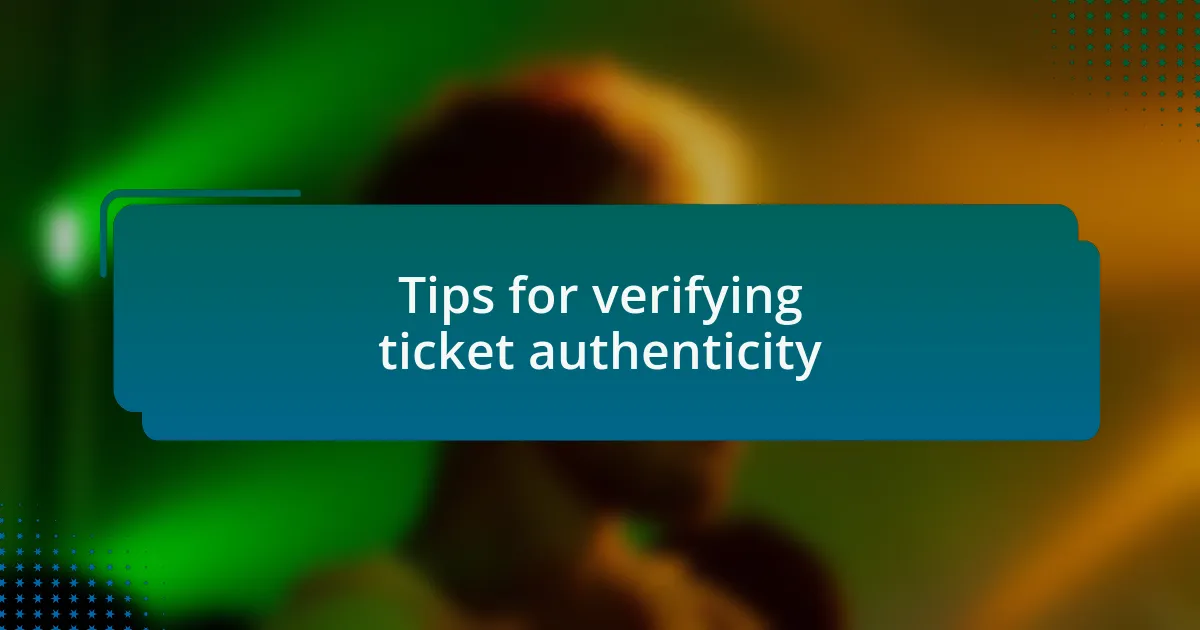
Tips for verifying ticket authenticity
When verifying ticket authenticity, I always look for distinctive security features, such as holograms or barcodes, that are typically present on legitimate tickets. I recall being excited to buy tickets for a festival only to spot the absence of these details, which raised my suspicions. Isn’t it reassuring when you know your ticket has the proper safeguards?
Cross-referencing the ticket seller against official festival communications is another strategy I use. I remember a time when I received an email confirmation for tickets I purchased. However, doing a quick check against the festival’s site revealed a different seller name. As you can imagine, my heart raced. Why take chances when a little due diligence can save you so much stress?
I also suggest verifying the ticket’s resale value; if it’s too good to be true, it probably is. For instance, I was tempted by an offer that seemed a steal, but a quick search revealed that the price was significantly lower than the average market rate. Why gamble on something so important when spending a bit more could ensure you’re at the event without worry?
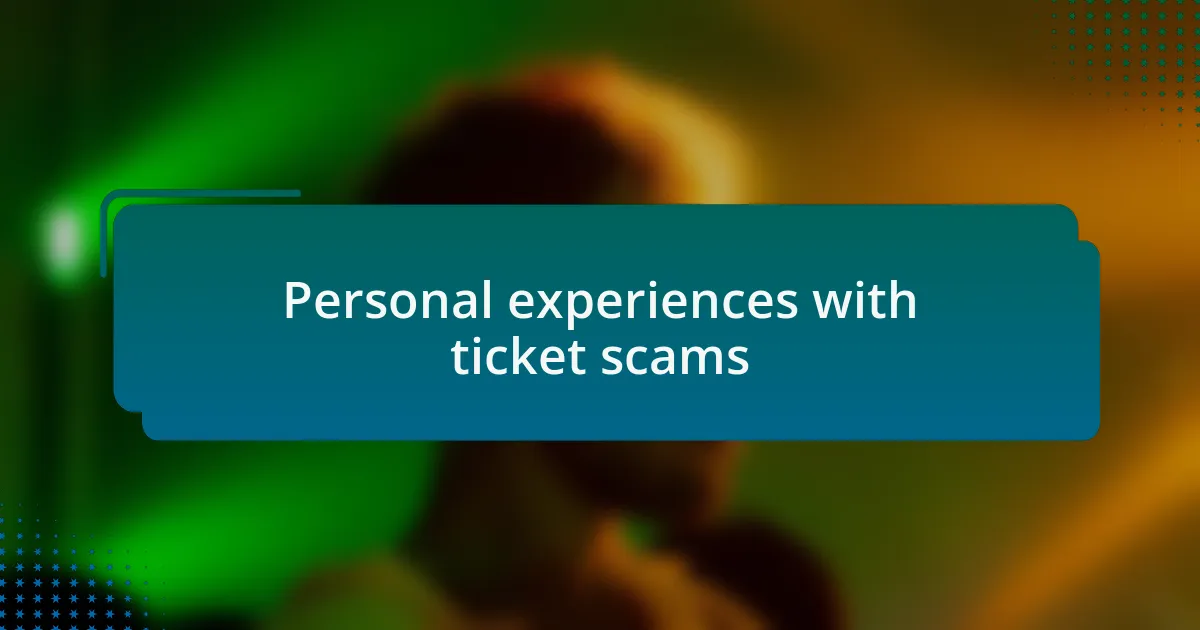
Personal experiences with ticket scams
It’s hard to shake off that pit-in-the-stomach feeling when you realize you’ve been duped. I remember trying to snag tickets for a popular music festival, only to find out weeks later that my so-called “golden” tickets were nothing but a clever scam. That sinking sensation of disbelief was profound, especially after I had told my friends how excited I was to finally attend that festival. How could I have been so naive?
One time, I got caught up in the excitement of a last-minute sale for a concert I desperately wanted to attend. The seller had flashy graphics and an incredible website that looked authentic. Sadly, once I clicked “purchase,” the ticket never arrived, and I was left with an empty feeling on concert night. That situation taught me a valuable lesson: always follow your instincts when something feels off, no matter how convincing it seems.
Additionally, I once encountered a friend who nearly fell for a ticket scam during festival season. He showed me a screenshot of a private seller on social media, and I could immediately see red flags. It was a nightmare thinking he might lose money and miss out on the experience he was so looking forward to. It made me reflect on how much vigilance we need in today’s digital age; after all, isn’t the joy of attending a live event worth the extra bit of caution?
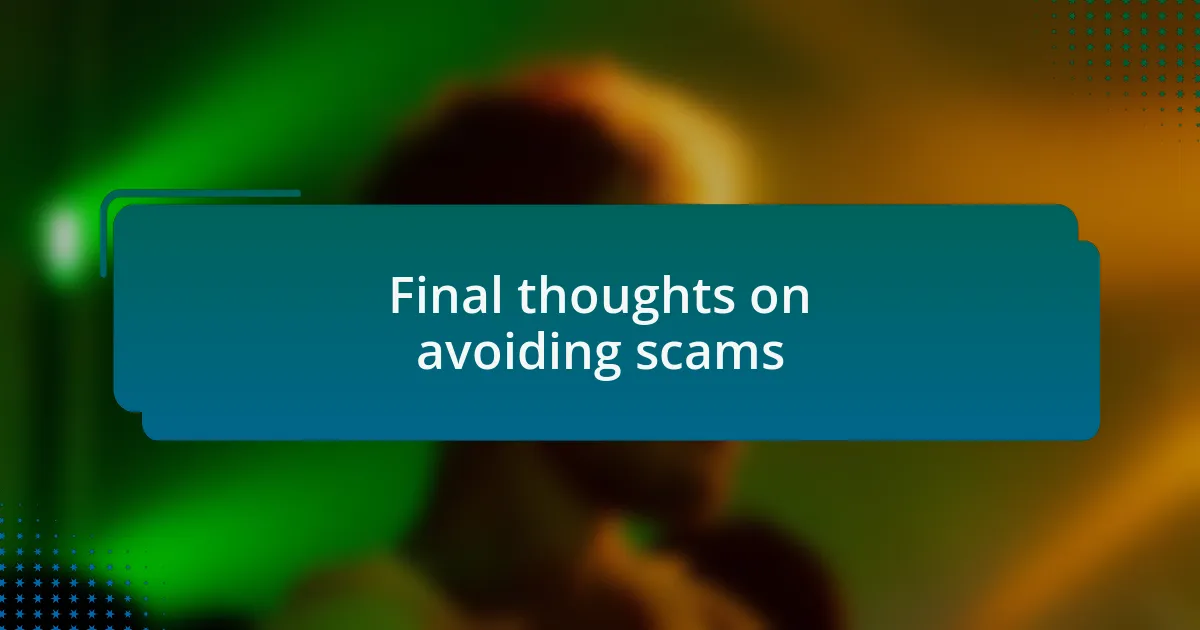
Final thoughts on avoiding scams
When it comes to avoiding scams, the best advice I can give is to trust your gut. There was a time I hesitated over buying tickets from a site I stumbled upon, even though they boasted prices that seemed too good to be true. The moment I hesitated, I remembered all those stories of friends getting burned, which solidified my decision to walk away—sometimes, that instinct is the best scam detector you have.
Stay informed about legitimate tickets and reputable sellers. I once found myself in a debate with a colleague who insisted on using a sketchy platform for concert tickets because it appeared to have better deals. I pointed out how vital it is to rely on official channels or well-known resellers. Their puzzled look spoke volumes; before we can protect ourselves, we need awareness.
Accountability also plays a crucial role. After hearing about a friend falling for a fake ticket offer on social media, we made a pact to double-check each other’s ticket purchases moving forward. It reminded me that creating a support system can amplify safety; after all, what’s more devastating than missing out not just on an event, but also on shared memories with friends?